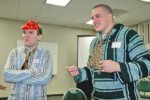Karneval party celebrates German take on lent

The sight of festive costumes and the smell of German food can only mean one thing for members of the German Culture Club: It’s Karneval time.
Karneval, or Fasching, is a German holiday that starts Nov. 11, at 11:11 a.m. on a low-key note and peaks on Rose Monday – or Rosenmontag – 42 days before Easter. The holiday is akin to Mardi Gras, and offers a chance for Germans to go wild and crazy before Ash Wednesday, when Lent begins.
The German Culture Club hosted a Karneval celebration Thursday. Approximately 45 people attended, most of which were students enrolled in German courses and their guests. The event featured a game of Catchphrase, a scavenger hunt, two costume contests and the chance for women to cut men’s ties in half.
“The traditional act of a woman being able to cut a man’s tie is supposed to be symbolic of castration,” said Hillary Wade, the treasurer of the German Culture Club. “In Germany on Weiberfastnacht, which is the last weekend of Karneval, any man on the street that night is fair game.”
Other traditions during Karneval include a practice in which all men 36 years of age have to sweep out a church and one in which any unmarried woman who is 35-40 years old has to make a wreath out of old cigarette boxes because she is considered an “old maid.” People also get off work and alcohol consumption is common on the streets.
While not a traditional Karneval event, the Schnitzeljagd, or scavenger hunt, involved people being split into several teams to find and take pictures of various items around the basement and first floor of the Phyllis P. Marshall Center. Team two finished first and was awarded a congratulatory certificate.
Food served at Saturday’s festivities included sausage or Wurst, potato pancakes or Kartoffelpuffer, a cheese plate, a meat plate, potato salad, jelly donuts and German bread. It was all catered by Mr. Dunderbak’s, a German restaurant.
According to Matt Minor, the club president, Karneval is mostly celebrated along the Rhineland in Germany, and the biggest celebration is held in Cologne.
The holiday has its roots in pagan Roman festivals, in which the masks and costumes are used to drive out the winter spirits and encourage the coming of spring and good crops. In the Middle Ages, it allowed the poor to disguise their socioeconomic status and share in the fun by intermingling with the upper classes. In modern times, people dress up as politicians to poke fun at them, he said.
The winner of the Most Original Costume contest was Martha Bleakley, a social science education major who was dressed as a milkmaid. She also designed an outfit for her friend Denisse Rodriguez, a biomedical science major and winner of the Most Craziest Costume contest.
“I am supposed to be a cuckoo clock girl that fell down,” Rodriguez said, with a drawn-in line representing a crack clearly visible on her forehead.
The German Culture Club has been on campus since 2003. Erin Newman, the secretary, says the club also hosts the Oktoberfest celebration in the fall, and is trying to get people together to watch German films. There are 70 registered members of the German Culture Club, which is open to anyone with an interest in German culture.





